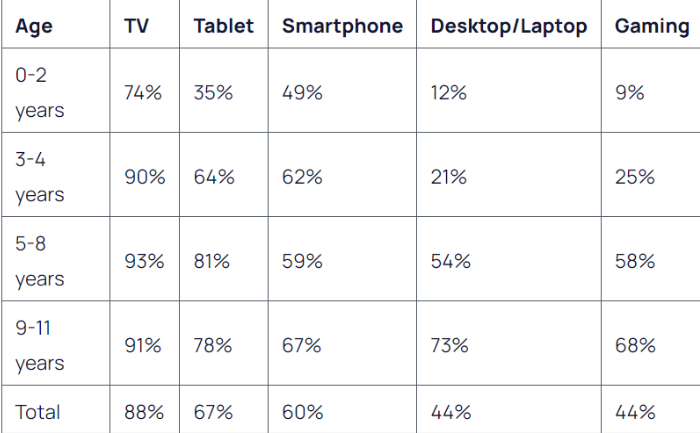
Update: This article was last updated on 20th March 2025 to reflect the accuracy and up-to-date information on the page.
74% of U.S. parents confessed their children, aged 2 and above, spend 5-6 hours a day stuck on screens.
Not surprising when you think about it, given that even kids aged 8-10 are putting in approximately 6 hours per day in front of a screen, and with increasing age, the figures shoot up to 9 hours a day.
With several studies pointing to the ill effects of too much screen time, including the creation of virtual autism and delayed mental functions in young children, it‘s evident that we require a solution.
Enter brain games! Exposing your children to engaging and interactive activities not only increases their mental acuity but also provides a means to restrict their screen time.
In this article, Moonpreneur will discuss the 10 best brain games for kids that are entertaining and equally educational.
Whether you’re looking for an exciting activity for a rainy day, a way to stimulate your child’s mind during vacations, or simply a break from the digital world, our list of brain games is your go-to resource.

Gadget-Free 10 Brain Games for Kids
1. Memory Match
In this game, the player must remember the location of the cards and match them. As kids get into the game, they work their memory muscles, sharpening their capacity for recalling information and building their cognitive skills.
One of the greatest things about “Memory Match“ is its versatility. The game is available in different themes and levels of difficulty, which means that children of all ages can play.
Advantages:
✅ Develops short-term and long-term memory
✅ Enhances concentration and focus
✅ Builds cognitive processing speed
2. Sudoku
Sudoku, invented in the late 1970s by Howard Garns, is a numeric puzzle game with powerful cognitive benefits. With its simple appearance, Sudoku challenges players to think logically and solve problems.
Through systematic thinking, players are required to fill a grid with numbers such that each row, column, and box has all the numbers from 1 to 9. This challenging game exercises critical thinking, logical reasoning, and problem-solving abilities, making it an excellent brain exercise.
Benefits:
✅ Trains logical thinking and pattern identification
✅ Improves problem-solving abilities
✅ Increases patience and focus
3. Chess
Chess is an old game based on strategy, which encourages children to think critically, possess planning skills, and analytical thinking. By playing the game, children learn to predict future moves, analyze options, and make strategic moves, developing their own skills to think ahead and to reason logically.
Moreover, chess helps improve concentration and patience since the players need to stay concentrated and show endurance when playing. As much as there is convenience online, playing a physical chessboard enables children to immerse themselves in the tangible and visual dimensions of the game, which generally improves their learning and experience.
Advantages:
✅ Enhances critical thinking and decision-making
✅ Enhances problem-solving skills
✅ Enhances patience and strategic planning
4. Word Search
Word search games are an excellent means of enhancing vocabulary, pattern recognition, and visual awareness in kids. They consist of locating concealed words within a grid of letters, either horizontally, vertically, or diagonally. Word search games are available in various themes, including animals, sports, or nature, to suit diverse interests.
Advantages:
✅ Enhances vocabulary and spelling abilities
✅ Improves pattern recognition
✅ Increases concentration and attention
5. Tangrams
These are ancient Chinese puzzles that teach spatial reasoning and enhance geometric understanding in kids. The player has to use seven geometric shapes to create different objects, animals, and shapes.
Tangrams encourage creative thinking, problem-solving, and visualization skills. You’ll find many interactive digital games with this concept, but sticking to the physical game is the best practice for children.
Benefits:
✅ Develops spatial awareness and visual perception
✅ Promotes creativity and problem-solving
✅ Enhances fine motor skills
6. Simon Says
Simon Says is an old favorite that enhances listening ability and memory. One individual is “Simon“ and provides instructions for a certain action. Kids are required to only obey when “Simon says“ is stated before the instruction.
This game increases attention, understanding, and accuracy in following instructions.
Benefits:
✅ Enhances listening and understanding ability
✅ Improves attention span and reflexes
✅ Refines impulse control and coordination
7. Puzzle Games
Puzzle games like jigsaw puzzles offer children hours of fun while improving spatial awareness, problem-solving, and fine motor skills. They are available in many themes and levels of difficulty, so select one that is appropriate to your child‘s interests and age group.
Advantages:
✅ Improves problem-solving and logical thinking
✅ Improves hand-eye coordination
✅ Refines patience and perseverance
8. Tower of Hanoi
Tower of Hanoi is a math puzzle that enhances reasoning skills and problem-solving in children as well as patience and planning.
It is made up of three rods and a set of disks of varying sizes. The game is to transfer the whole stack of disks from one rod to another with certain rules to be followed.
Advantages:
✅ Improves logical reasoning and strategy
✅ Promotes patience and step-by-step problem-solving
✅ Enhances mathematical skills
9. Rubik’s Cube
Work with the Rubik‘s cube encourages patience, persistence, and logical reasoning, develops cognitive thinking, and develops analytical skills among young minds. It‘s a great way to keep kids interested for hours, whether it‘s playtime, traveling, or whenever they become bored.
Benefits:
✅ Increases cognitive flexibility and spatial cognition
✅ Develops problem-solving skills
✅ Refines memory and concentration
10. Coding Games
While we would all love children to live life free from the dependency on digital screens, there is a certain exposure needed to provide them with relevant skills.
Computer programming is introduced to children by online coding games, and logical thinking, problem-solving, and computational abilities are developed.
Advantages:
✅ Logical and analytical thought develops
✅ Creativity and problem-solving are improved
✅ A strong STEM learning foundation is created
Real-Life Applications of Brain Games for Kids
While brain games for children are entertaining and motivating, they are also important in setting children up to tackle everyday and professional challenges. Every game contributes to the building of valuable cognitive skills that one will apply in life and in future careers.
Chess → Strategic Thinking in Leadership
Playing chess boosts decision-making and critical thinking abilities that are valuable in leadership positions in most careers, ranging from business to politics.Sudoku → Analytical Skills for Math & Science
The analytical and reasoning abilities learned from Sudoku assist children in doing well in mathematics and science-oriented areas, including engineering, finance, and data analysis.Memory Match → Better Academic Recall
Excellent memory capabilities aid in good grades, allowing children to learn better in subjects like history, language, and science.Word Search → Better Reading and Vocabulary for Communication
Building vocabulary with word search games enriches communication skills and is valuable to careers in writing, law, public speaking, and marketing.Rubik’s Cube → Problem-Solving in Engineering & Tech
Being able to break down intricate problems using logic and pattern recognition maps directly into the fields of software development, robotics, and AI.Coding Games → Future Tech Careers
In the modern digital age, knowing coding is an asset. Brain games for children that incorporate coding equip them for future careers in technology, software engineering, game development, and artificial intelligence.
Conclusion
The 10 brain games listed above present a varied selection of challenges, stimulating memory, problem-solving, critical thinking, and other mental skills.
By integrating these games into children‘s schedules, you can help actively develop their minds while giving them a wonderful time. Look on with joy as your young ones eagerly grasp each challenge, overcome hurdles, and build the resilience needed to excel academically and in all walks of life.
These brain games are the secret to unlocking their potential while maintaining the thrill. 🙂
Moonpreneur is committed to revolutionizing conventional education and future-proofing the next generation with comprehensive learning solutions. Its Innovator Program is shaping tomorrow‘s workforce by educating students in AI/ML, Robotics, Coding, IoT, and Apps, facilitating entrepreneurship through experiential learning.


























Can you name a game that combines math and strategy in a fun, competitive way, perfect for sharpening young minds?
Absolutely! ‘Math Bingo’ is an excellent game that seamlessly blends math skills with strategic thinking in an enjoyable, competitive format. Players solve math problems to mark off numbers on their bingo cards, promoting quick mental calculations and fostering a competitive spirit while honing their mathematical abilities.
What game uses storytelling and imagination to promote language development and critical thinking in children?
The game ‘Once Upon a Time’ harnesses storytelling and imagination to bolster language skills and critical thinking in children. By crafting narratives based on cards, players develop creativity, communication, and analytical abilities, making it an enriching educational tool.
Why are brain games good for kids?
Brain games improve kids’ cognitive skills and learning in a fun way, but a balanced approach with diverse activities is essential for overall development.
Do brain games increase IQ?
Brain games directly impact on increasing overall IQ is not well-established, as IQ is influenced by various other factors.